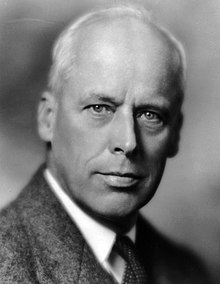Norman Thomas
Norman Mattoon Thomas (born November 20, 1884 in Marion , Ohio , † December 19, 1968 in Cold Spring Harbor , New York ) was a leading American socialist and six-time presidential candidate for the Socialist Party of America .
Thomas was born and raised in Ohio to a Presbyterian minister. In elementary school he was a newsboy for Warren G. Harding's Marion Daily Star . Thomas later attended Princeton University and graduated from Marion High School in 1905. He then attended a union theological seminar and became a socialist there. He was destined to be a Presbyterian pastor in the East Harlem neighborhood of New York .
Thomas rejected the entry of the United States in the First World War from. In January 1918 he founded The World Tomorrow newspaper . In an April 1918 edition, he wrote:
Only those who have felt something passionate about social justice and industrial democracy can see how real revolutionary Russia, with all its flaws and excesses, the vaunted country, the fatherland of the soul of radical workers all over the world, is.
The Russian revolutionaries never felt obliged to return this compliment. Thomas always said that Leon Trotsky was "just a politically misunderstood person".
From 1921 to 1922 Thomas was editor of The Nation newspaper and in 1922 became head of the League for Industrial Democracy . After the war, he was a founding member of the American Civil Liberties Union . He failed as a socialist candidate for governorship in New York State in 1924 and 1938 .
After the death of Eugene V. Debs in 1926, Thomas became socialist spokesman and presidential candidate in 1928 , 1932 , 1936 , 1940 , 1944 and 1948 . He also took part in elections to the US Senate , the US House of Representatives and the New York Senate . As a clear and committed spokesman for democratic socialism , his influence was considerably greater than that of a typical perennial candidate. He clearly pointed out the difference between socialism and communism and explained the differences between the movement he led and revolutionary Marxism . Thomas was a member of the America First Committee , an isolationist movement that sought to prevent the United States from participating in World War II in 1940/41 . In 1948 he was a board member of the American Committee for a United Europe .
Thomas wrote various books, among them his passionate defense paper about passionate Protestants in the First World War , which was entitled Is Conscience Crime? appeared.
Web links
- Literature by and about Norman Thomas in the catalog of the German National Library
- Newspaper article about Norman Thomas in the press kit of the 20th century of the ZBW - Leibniz Information Center for Economics .
- Norman Thomas in the database of Find a Grave (English)
- The Political Graveyard
| personal data | |
|---|---|
| SURNAME | Thomas, Norman |
| ALTERNATIVE NAMES | Thomas, Norman Mattoon (full name) |
| BRIEF DESCRIPTION | American socialist |
| DATE OF BIRTH | November 20, 1884 |
| PLACE OF BIRTH | Marion , Ohio |
| DATE OF DEATH | 19th December 1968 |
| Place of death | Cold Spring Harbor , New York |
